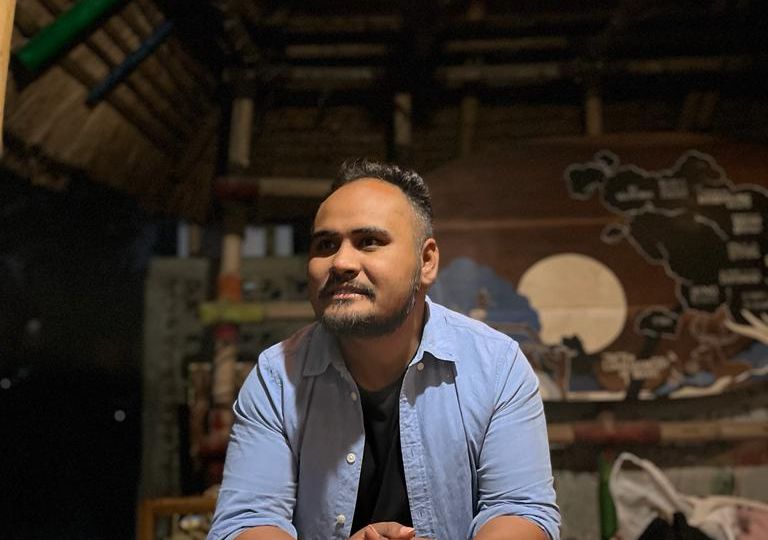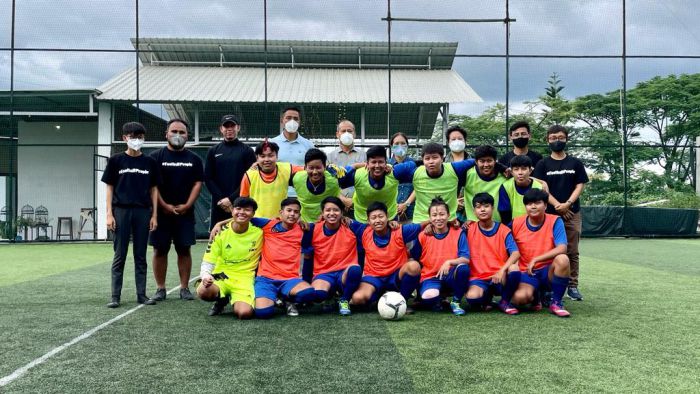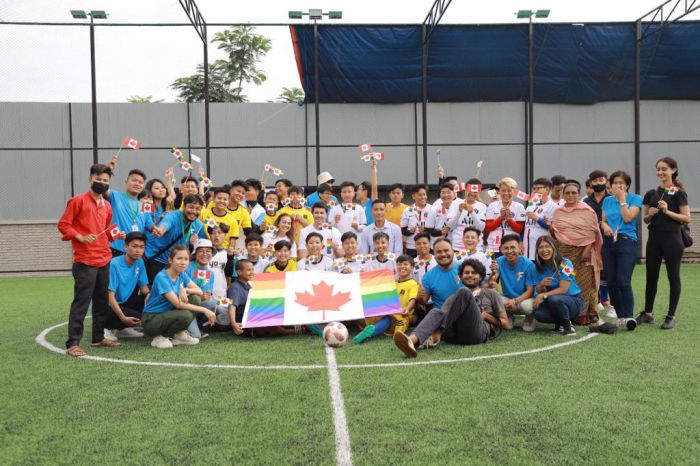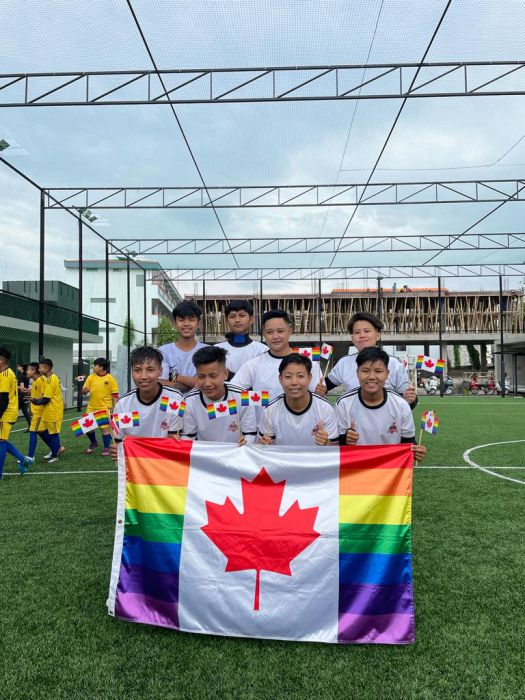
Sadam Hanjabam is Founder & CEO of the Manipur based organisation Ya_All, that supports and advocates for the creation of an inclusive society through on the ground youth engagement at multiple touch points. Focusing on life skills, advocacy, research and capacity building on health, education, livelihoods and overall wellbeing, Ya_All works to empower adolescents, young people and the queer community towards empowerment and inclusion. Sadam is a TEDx Speaker who has been featured by UNESCO in their #KindnessMatters campaign and book of stories, UNDP, Oprah Winfrey, Vogue, AppleTV, Facebook, and is a UN Youth Envoy.
Shikha Aleya (SA): Sadam, thank you for being here with us to chat about Sports and Sexuality. You are in a unique position to do so, having put together what is described as being India’s first all-trans football team. What have been some of the issues and consequences of this journey, for you, and for these young footballers?
Sadam Hanjabam (SH): We created the football team Ya_All Sports Club under Ya_All, in 2020. Before that, from 2017, we used to run as a collective. During that time we had no safe space, or a support system, where we could talk about sexuality, or about ourselves, or issues that queer and trans people face. So, being from Manipur, we somehow had to find entry points which connect well with the local communities and the region. That is why we turned towards sports and we have been using it to talk about our identity and inclusion.
Basically it grew into a bigger movement later on when we started pointing out the binary in sports. We realised that many people from the queer community, even though they are not openly queer, are still playing with teams, and in different sports, but because of the fear of stigma, discrimination, and being left out, they do not come out as being queer. Transgender persons often are not able to play or participate in sports. Even though the Supreme Court in the NALSA judgement recognised transgender persons as a third gender, they don’t have that category to play a sport. So they have to fit into the men’s or women’s category and play.

With the creation of Ya_All Sports Club in 2020, what we have seen is that many people are now questioning this binary in sports. We just started as a model team, and became the beginning of a movement. I think it has been really successful, and we have reached platforms like Apple TV featuring in a documentary series, The Me You Can’t See, with executive producers Oprah Winfrey and Prince Harry, amongst others, advocating for mental health conversations. There are many other places where our movement has gained momentum. So people are starting to talk about inclusion in sports as a consequence.
The footballers at Ya_All are mostly young transgender men in the age range of 15-30 years. Earlier, they used to find it difficult to interact with people, and especially with their families. Being transgender was considered very unacceptable by the families of players and by themselves also. When we talked about identity issues, it was mostly advocacy and workshops on health and so on. They could not just go out and be themselves. But when we started talking through sports, even the parents and friends started seeing it as a more neutral ground, easier for their coming out. They started seeing it as something productive, different, not like going out in the street during a pride walk. The parents think that their children are doing something good for their health, physical health and fitness, and also for their mental health. So, acceptance increased in that way, because sports you could talk about.
SA: About acceptance, and in sports, what are your thoughts around the question of fairness, advantage and disadvantage in sport when a trans person is competing in a gender category of their chosen gender? For example, last year in this case where the Kerala High Court ruled that persons who are transgender should be allowed to participate in the category of the gender they identify with? Or in the current debate around World Athletics (WA) excluding male to female transgender athletes from competing in the women’s category?
SH: Most importantly, the debate has been around fixing the athlete’s gender into the two boxes of men and women. They are not looking beyond that. There could be at least one more gender, when the Supreme Court has said that there are three genders in India – men, women, and transgender people. This the Court has already acknowledged, and they have made a law, an act, for transgender persons. Why are we still fixated on the man and woman binary?
So even though there are a lot of opportunities ahead, a lot of things which we can do, every time we talk about trans persons or queer people in sports, it comes back to fitting their identity into men’s or women’s categories. Why are they not trying to open up a separate category for transgender persons where they can compete among themselves? Where these issues will not come up? You recognise them but you don’t give them the platform to participate in their own gender category. People are debating because, for example, a person was born, and was identified female or as male, but they do not identify with this gender assigned to them. So we will try to again fix them into the binary but not into the gender they identify themselves as. So why are we so afraid of opening up a separate category for transgender persons and seeing how many people come up and how many people are represented?
This was a big question when the 377 judgement process was still going on – that how many people do you have? We were called a ‘minuscule minority’. They just assumed this and asked that for a ‘minuscule minority’ why is this judgement necessary? So in sports there is also a pre-judgement, a pre-notion, among all policymakers that there are very few transgender persons or very few people from the queer community who are into sports so even if we open it up not many people will come, and it is not important. What you see are the technical glitches in creating a separate category, but the real issues – discrimination, abuse, there are so many things that can be resolved if people think beyond the binary and open up a category.
SA: Sadam, so far we have spoken of just one facet, gender and sexuality, in the field of sports. Most people live a life of multiple intersecting identities based on race, ability, age, caste, class, and occupation, amongst others. How can sports #EmbraceEquity in support of the theme of International Women’s Day as adopted in March this year?
SH: Sport has a special place – it brings us together, cutting through the intersections that we experience. When we are working in the Northeast, in Manipur, and also with the queer and trans community, we find we are dealing with different situations. There are people who have been affected by conflicts, and there are people who belong to different indigenous communities. Also, the Northeast has less visibility if we talk about gender or queer and trans representation. One thing that binds us all together is sports. Sports has a very neutral language.
When we are talking about the theme of embracing equity we can see sports as a neutral space that has the potential to be a space where everyone can connect, together, without language, and without the domination of any community over another.

When we started the football teams and games for the trans community, using sports as a medium of interaction, the Northeast, and Manipur, was a conflict area. Many of the things we wanted to do, many of the dialogues or conversations we wanted to have, could not be achieved by any means. Sports became a way where we could connect without judgement, where we could connect without privilege, and without the intrusion of the popular or cultural belief systems. By belief systems I mean specifically where queer people are stereotyped as pursuing certain vocations and jobs which are mostly considered as soft, or requiring soft skills. Or the stereotype is that queer people are not into sports or do not have the physical and mental fitness needed for it. People never thought queer people could be good at sports, but when we started our work people realised that they were wrong.
That’s why when we talk about equity, such as for the theme of Women’s day, a lot of it is about creating and providing access to platforms, such as this. Even in a state like Manipur, considered a powerhouse of sports, we don’t see queer people from the community coming out and playing. Our movement looks towards that direction, creating opportunities for meaningful inclusion and participation for queer people through our initiatives like the annual Queer Games. In spaces like this queer people can also come up and claim spaces in sports, otherwise society will keep saying, “You people are not coming out so how will we give you opportunities?” Or that, “You people are invisible so how can we give you opportunities?”
Embracing equity is a responsibility partly placed on everyone. Unless we question, until and unless we speak out, and create spaces where it is safe to do this, people are still ignorant about the issues we face. I think we have suffered a lot for this reason – because people have been ignorant and we haven’t spoken out of fear. So there needs to be a way out between these two.

Another thing we have seen is that mostly younger people are coming out, but while many people want to get into sport they are not able to go a long distance because sport has been something which does not pay well for the people at the grassroots. Famous athletes get paid very well but for grassroots persons or organisations who are playing at a very basic level, the kind of investments they may make in terms of time and resources and many other things is not converted into wealth. Nor into something more meaningful where they can engage more with further activities. So, they join sports for the passion but mostly cannot continue because there is lack of material and economic support. Similarly see what happens with the women’s cricket teams or women’s football teams when we compare them to men’s teams. When we say we are working with queer people again there is further alienation and elimination. The responses we get are like “Hey! We are still having issues with women’s teams. How come you are coming out with a transgender team? We don’t want to talk about it.”
So, a lot of things need to be done around equity. It is just starting. But somehow, we have begun and people have joined in and I think this is just the start of the movement.
SA: Thank you for these many significant observations. Our last question is about creating spaces and environments that are safe, self-affirming and inclusive. Do you think kindness could help transform some of the ground realities and support positive change?
SH: Two to three values which I really count as important are kindness, compassion, and self-love or self-acceptance. These have really helped me personally through my own recovery journey – from being a substance user to a person who is working with the community and leading the community. First, accepting myself was my biggest strength. Not being able to accept myself because of not having those safe spaces, affirmative spaces, was a big barrier. During my recovery journey, not being able to find such spaces made things very difficult for me, but when I found them or created them, such as this one – Ya_all in Manipur, I found support for my own recovery.
So this, my own lived experience of recovery, made me realise that kindness to yourself is important. Kindness to others can only start when you are kind to yourself. In the last five years, what we have done in Manipur has moved ahead in a different way because we have also tried to respect the local values and local belief systems. People see that we are not hurting anyone in the process. They see us as kind and compassionate. What has really helped us get ahead in our work in a very short span of time is this connecting with other people, through kindness.
Cover Image: Courtesy of Sadam Hanjabam